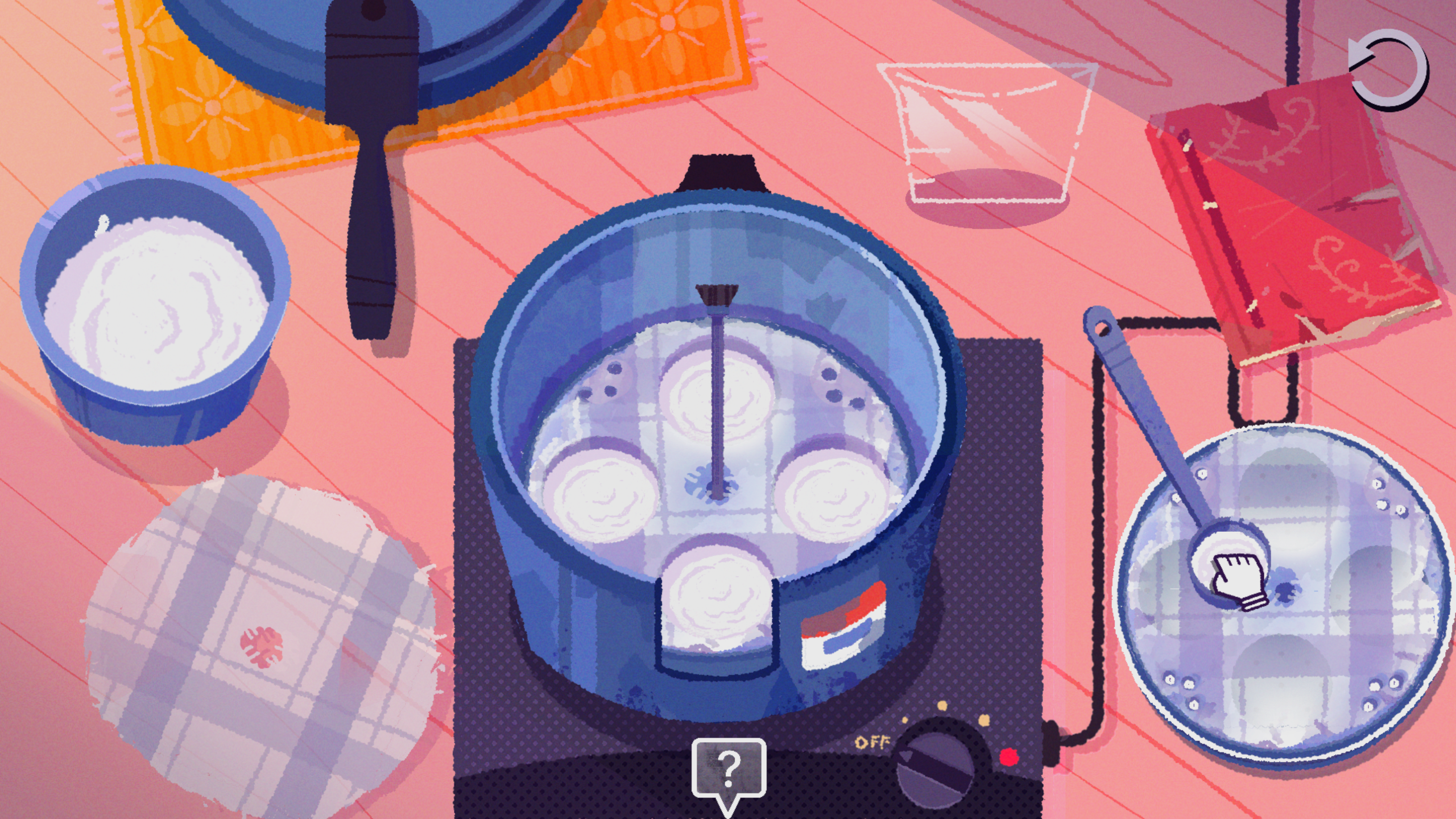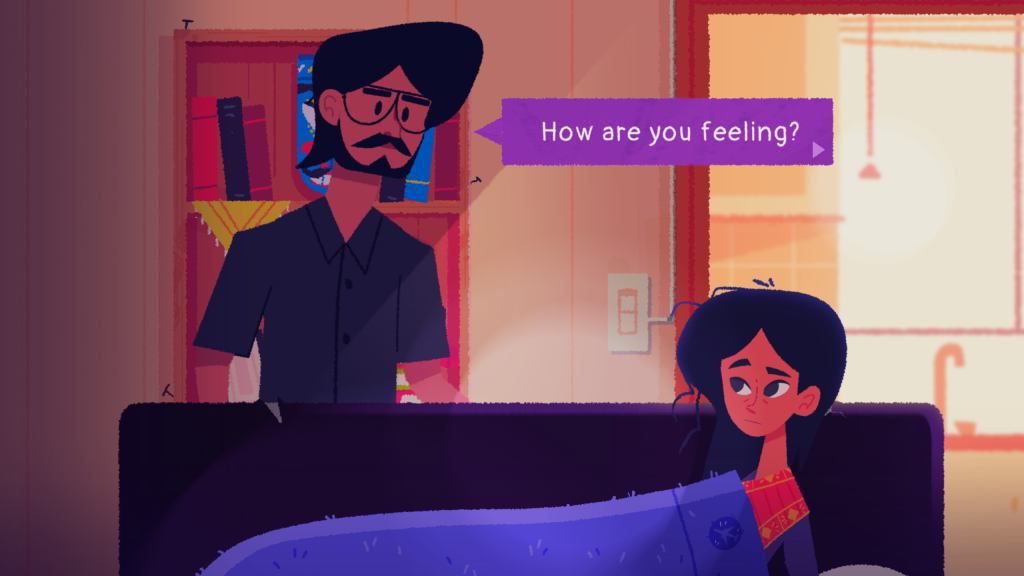
Venba is a narrative cooking game from the small team of developers at Visai Games. Its lead developer, Abhi, describes it as an exploration of the relationship between first-generation immigrant parents and their assimilated children.
The core mechanical idea of Venba is a series of cooking minigames that are interleaved with the story and dialogue scenes. Each one aids in telling the story of Venba and her husband Paavalan as they contend with a new life together in Toronto after moving away from their home in southern India. After their son Kavin is born, they navigate the challenges of raising him in a place with different opportunities, but a much greater distance from the home they know. Cooking plays many roles, from providing simple staples for packed lunches to attempting nostalgic recipes from an old cookbook that Venba's mother made for her.
Food For Thought
Many of the cooking sections involve some light puzzle solving to fill in the gaps in the incomplete instructions from Venba's mother. Advancing past these sections may involve some trial and error to get everything to come out right. But they're grounded in real home cooking techniques, and the possibility space is small enough to prevent any serious roadblocks. Executing the steps, once you know them, is as simple as moving objects around the screen; the various actions are tactile and engaging, but not overly precise or fiddly. Without ever taxing the player too much, the puzzling and the mechanical steps convey the effort that it takes to cook for other people, but also the deep satisfaction that it can bring.
While Venba's ideas about cooking are familiar to immigrant families of many different backgrounds, its specificity is also deeply important. I've never personally attempted any of the recipes in the game, but as best as I can determine, the Tamil recipes that it features are lovingly rendered, with attention paid to critical nuances in technique. It inspires a sense of curiosity in players who may never have tried these dishes, and a mouthwatering familiarity in those that have had them before. I can't think of many video games that have presented me with real dishes that I hadn't ever heard of before: Venba accomplishes this (despite my familiarity with some of the dishes, which are also popular with my Bengali family). I truly believe that Venba could inspire players to attempt recipes themselves or seek out restaurant preparations of dishes they may not have otherwise known about, and I hope that it does.

Lost In Translation
Venba's storytelling is driven by its cooking, but its dialogue writing in between cooking scenes is concise and poignant. Rather than being strictly autobiographical of its lead writer, its constructed from many vivid and personal details from the whole developer team. Its music is inspired by the soundtracks of Tamil films throughout the years that it spans, its art is colorful, rough-edged and expressive. Its scenes are populated with small details that reveal the tension between the comfort of assimilation and the things we leave behind along the way.
The story skips through the years and visits its characters at different times, finding just the right moments to bring into focus. Rather than fixating on major events, it also includes subtle turning points or moments of introspection that communicate how the characters have grown and changed. The depiction is honest, warm, and sympathetic, drawing attention to the casual cruelties of family but also reminding us why we're compelled to forgive them.
Venba's story walks a careful line, balancing hopefulness with a sometimes-bleak acknowledgement of hardship and alienation. The melancholy is an important element, a necessary part of witnessing the ways that immigrant experiences transform our relationship to culture and family history. In the wake of regrets and detachment, we can find true connection and closure.
Even though Venba's language and regional cuisine don't line up exactly with my family's, I can see the echoes in my own relationship to my Bengali family: the roughly-transcribed recipes from my grandmother that I've tried to make, the distance I feel when my mom's family speaks to one another in a language I never learned. I know deep down that it isn't too late for me to strengthen those connections... but I also know that it demands a lot of effort, introspection and humility. I doubt that Venba intends to guilt me, but I believe it hopes to remind me that connecting to one's roots can be worthwhile. Our parents and grandparents still have stories that they haven't told us; there are recipes we've not yet made together.

Conclusion
In a sense, Venba lands so highly on my list because of its excellent focus and coherence. It's a well-honed piece of art that knows exactly which narrative tools to use, and when. Its use of cooking as storytelling is more than meets the eye, deeply attentive to details and to the many different contexts in which we cook for one another. It never quite complicates its mechanics so much to detract from the ideas conveyed, and it's short enough to easily play in an evening.
But the real reason it lands so highly is how it made me feel. I've found that as I get older and have a wider range of experience, I'm less often truly emotionally affected by games in the ways I once was. I recall my emotional responses to video games as I've grown up and see fewer and fewer that affect me the way Gone Home, The Walking Dead, The Last of Us, and many others did when I first played them. Maybe those games were all just that good, maybe I've become less easily affected; probably a little of both. Venba was the first game in a long time to make me cry. I wasn't ready for it to strike so close to home for me, but I'm glad that it did. I should go call my grandma.